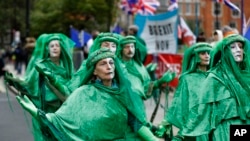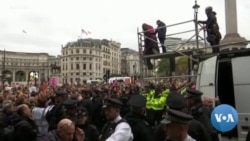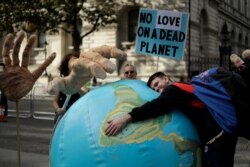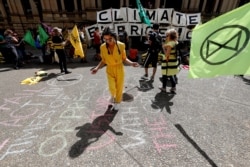Hundreds of climate change activists camped out in central London on Tuesday during a second day of world protests by the Extinction Rebellion movement to demand more urgent actions to counter global warming.
Determined activists glued themselves to the British government's Department of Transport building as police working to keep streets clear appealed to protesters to move to Trafalgar Square.
Cities in Australia, elsewhere in Europe and other parts of the world also had climate change protests for a second day.
British Prime Minister Boris Johnson appealed Monday to the protesters to stop blocking London's streets. He called the activists “uncooperative crusties” who should abandon their “hemp-smelling bivouacs.”
Mike Gumn, 33, a National Health Service manager with two children, said he used a day of annual leave so he could attend the demonstration. Gumn, of Bristol, took umbrage at Johnson's characterization of climate change activists as “hippies.”
“I want to make a statement that (the activists) are all different sorts of people from all different walks of life, not just people you would call hippies,” he said.
Authorities arrested 319 people at the London protests on Monday.
Disruption continued in other major cities. In Brisbane, Australia, protesters chained themselves to intersections in the city center and three people locked themselves onto barrels filled with concrete. A protester hanging from a harness beneath Brisbane's Story Bridge and brandishing “climate emergency” flags was taken into police custody and charged with unregulated high-risk activity.
Queensland police confirmed 29 people - ranging in age from 19 to 75 - were arrested in the city, and six others were arrested in Sydney after lying in a downtown street intersection.
More than 100 protesters dressed as bees at Sydney's Hyde Park to highlight their claim that insects are under threat due to the impact of humans on the environment.
Some activists camped at Melbourne's Carlton Gardens overnight before marching to a street corner locked down by more than 100 protesters in inclement weather. Police arrested 59 people for blocking an intersection.
“I don't know that shutting the city down necessarily wins you many friends,” Victoria premier Daniel Andrews said.
In Perth, about 50 protesters converged outside the offices of The West Australian, the city's daily newspaper. The front page of Tuesday's paper was left intentionally blank for protesters to use as a placard.
Founded in Britain last year, Extinction Rebellion has chapters in some 50 countries and wants to achieve net zero carbon emissions by 2025.
On Monday, activists with the movement stopped traffic in European cities and smeared themselves and emblems of Wall Street in fake blood and lay in New York streets.
In Berlin, 300 people blocked Potsdamer Platz, placing couches, tables, chairs and flowerpots on the road. They earlier set up a tent camp outside German Chancellor Angela Merkel's office out of dissatisfaction with her government's climate policy.
Merkel's chief of staff, Helge Braun, criticized the group's tactics.
“We all share an interest in climate protection, and the Paris climate targets are our standard in this,” he told ZDF television. “If you demonstrate against or for that, that is OK. But if you announce dangerous interventions in road traffic or things like this, of course that is just not on.”








